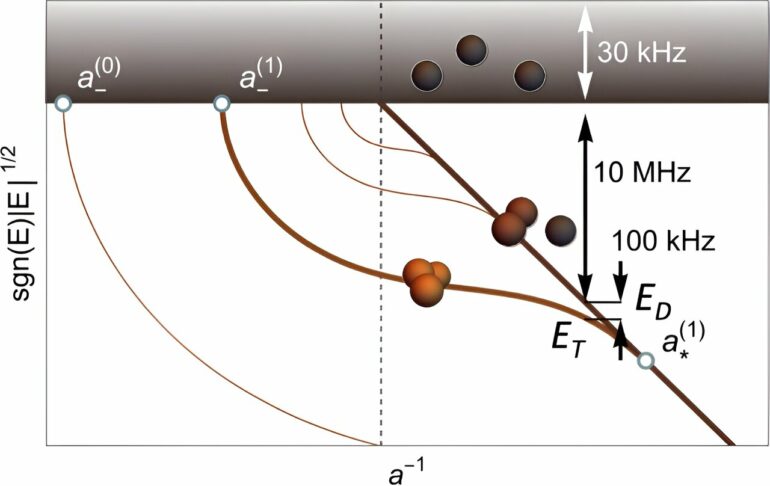Researchers have unveiled the extraordinary behavior of weakly-bound three-atomic molecules, defying conventional understanding of quantum mechanics. In a study recently published in Nature Communications, a team of scientists from Bar-Ilan University in Israel, in collaboration with theoreticians in the United States, sheds light on the mysterious resilience of these exotic molecules against dissociation.
These molecules, known as Efimov trimers, are so weakly bound that even a tiny amount of thermal energy prevents their formation. In theory, Efimov trimers live only within a certain parameter space requiring very strong interactions between constituent atoms. When these interactions become weaker the trimers are expected to dissociate either into free atoms or into a bi-atomic molecule and a free atom.
In their study, the researchers created a special environment of one-millionth of a degree above absolute zero (one microkelvin) to observe and study these exotic states, which revealed a remarkable phenomenon: Efimov trimers display surprising resistance against breaking apart, even when immersed in the continuum of states.
“Our research uncovers a fundamental aspect of quantum mechanics, showcasing the tenacity of these exotic molecules despite existing outside of the parameter space initially predicted,” explains Prof. Lev Khaykovich, of Bar-Ilan University’s Department of Physics, who led the study with colleagues from JILA at the University of Colorado, Boulder, the University of Maryland and NIST, College Park, Maryland.
“This discovery challenges existing paradigms and underscores the importance of curiosity-driven research in expanding our understanding of the laws of quantum mechanics.”
Employing a unique experimental method developed in their laboratory, the researchers created a quantum mechanical superposition state of a three-atomic molecule and a bi-atomic molecule, along with a single free atom. Through meticulous observation and analysis, they achieved unparalleled precision in measuring the energy levels of these novel molecular structures and uncovered the unexpected survival properties of the Efimov trimers.
Consecutive thorough theoretical investigation revealed a reshaped form of interactions that explained the experimental observations but was completely overlooked in all previous studies.
One of the most intriguing puzzles uncovered by the study that remains unexplained is the unexpectedly long lifetime of the quantum mechanical superposition state. This phenomenon has baffled scientists worldwide, opening new avenues for exploration and redefining the boundaries of our knowledge.
“This work exemplifies the essence of curiosity-driven research, leading us to unexpected realms and posing profound questions that challenge our understanding of the universe,” says Prof. Khaykovich. “Through collaboration and dedication, we continue to unravel the mysteries of the physics of atoms and small molecules, paving the way for transformative discoveries.”
The findings of this study have brought excitement within the research community, showing that even after decades of research, quantum mechanics continues to surprise. As scientists embark on further investigations, the journey promises to uncover even more captivating insights into the nature of matter and its interactions.
More information:
Yaakov Yudkin et al, Reshaped three-body interactions and the observation of an Efimov state in the continuum, Nature Communications (2024). DOI: 10.1038/s41467-024-46353-1
Provided by
Bar-Ilan University
Citation:
Exotic molecules embedded into continuum refuse to break apart, defying initial expectations (2024, March 14)



